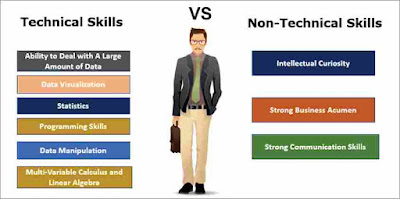What is Tech and non Tech companies
Technical Skill vs. Non-Technical Skills: What's the Difference?
In today's competitive business environment, strong intelligence is more important than ever. However, which type of ability is more important? Is intelligence more important than ignorance?
Answer, both expertise and incompetence are important.
The specific abilities required to perform a particular job are called skills. For example, to become a software engineer, you must be able to write code. If you are a doctor, you should know about surgery.
Here are some reasons why skills matter:
- If you have skills, you can create.
- Having skills can help you find a job.
- Technical knowledge can help you succeed professionally.
- The value of non-intellectual skills is just as important as intellectual skills.
Here are a few examples of the importance of non-technical skills:
- If you don't have technical skills, you can work better with others.
- If you don't have the skill, you can communicate better.
- You can use your non-traditional skills to solve problems.
- Someone can help you as a pioneer.
Here are some ideas:
Education:
You can improve your skills by obtaining a certificate or certification in a particular field. You can learn non-technical skills by taking courses or workshops.
Experience:
Gaining experience in a particular field can help you improve your skills. Working on projects or group work can help you improve your non-technical skills.
Networking:
You can develop your skills and abilities by interacting with people working in your area.
You can meet new people online, on social media or on forums.
Educate Yourself:
You can learn technical and non-technical skills by reading books, articles and blogs. You can watch the recording or follow the website.
There are two types of intelligence:
Other ways to improve yourself in professional and non-professional areas:
Getting started.
- Develop your own skills rather than following the advice of others.
- Monitor and explore opportunities for learning and development.
- Just try. Creating takes time and effort.
If you keep learning and practicing, you will see improvement.
Accept criticism.
Get feedback from colleagues, mentors and supervisors. This will help you identify areas where you can improve and change.
is still waiting. Developing skills takes time.
Skill Development
Communication:
An important non-technical skill that can help you succeed in any business is communication. Taking a public speaking class, joining a Toastmasters club, or reading a book on communication are just a few of the options you can use to improve your communication skills.
Teamwork:
Apart from intelligence, another important factor is teamwork.
Participating in team building activities, working on a project team, or volunteering for a cause you're passionate about are all ways to improve your work skills.
Problem Solving:
Problem solving is an important non-technical skill that can help you identify and solve problems in the workplace. Take problem-solving classes, read related books, or practice problem-solving in everyday life to improve your problem-solving skills.
Leadership:
Leadership is an important non-technical skill that can help you succeed in business. There are many ways to develop your skills, for example by studying management, reading books on management, or practicing management in your daily life.
be a good person Listening is one of the most important aspects of communication. You show your respect for others by listening to their thoughts and ideas.
Be patient.
It's important to respect someone's opinions, even if you disagree with them.
This shows that you are willing to learn from others and open to new ideas.
Hello. The right attitude at work can make a big difference. When you study, you will be able to do and motivate.
can be changed.
It is important to adapt and accept change because not everything goes as planned. When you are strong, it is easier to deal with changes and challenges.






